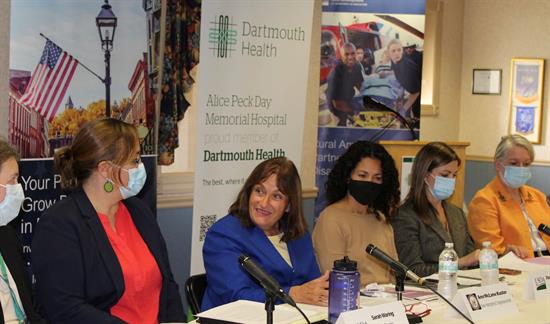Press Releases
Kuster Joins USDA Under Secretary Torres Small for Announcement of Significant Federal Investments in Health Care for Rural New Hampshire Communities**Yesterday, USDA-RD announced $2.31 million in federal grants for Granite State health care institutions.**
Lebanon, N.H.,
October 13, 2022
Yesterday, Congresswoman Annie Kuster (NH-02) joined U.S. Department of Agriculture (USDA) Rural Development Under Secretary Xochitl Torres Small, local officials, and local health care leaders at Alice Peck Day (APD) Memorial Hospital to discuss a $1 million grant to the Families Flourish residential treatment program and announce the $2.31 million in new federal funding for health care facilities in rural New Hampshire communities. “It was wonderful to welcome Under Secretary Xochitl Torres Small back to the Granite State, and to be with USDA – RD Director for New Hampshire and Vermont Sarah Waring, our friends from Alice Peck Day, as well as Families Flourish and other health care partners, to highlight these new federal grants,” said Rep. Kuster. “Expanding access to health care in our rural Granite State communities is crucial, and I was thrilled to join in announcing this significant federal funding for Families Flourish as well as additional grants through the Emergency Rural Health funds for Mid-State Health, West Central Behavioral Health, and HealthFirst.” “I have worked to support Families Flourish because its mission is so important. It will enable access to high-intensity residential substance use treatment for pregnant and parenting women in a warm, supportive, and safe environment that welcomes women with their children,” Rep. Kuster continued. “Our state and this region have been hit incredibly hard by the opioid epidemic and evolving addiction crisis, and Families Flourish’s new site will create a meaningful and lasting difference in the lives of so many Granite State women and their children. I will continue working to expand access to health care in our rural communities, including treatment for addiction and mental health challenges.” “Access to modern and sustainable health care infrastructure is critical to the health, well-being and prosperity for the millions of people who live in rural and Tribal communities,” Torres Small said. “That’s why the Biden-Harris Administration remains committed to making sure that people who need it most, no matter where they live, have access to high-quality and reliable health care services like urgent care, primary care and dental care. Through the Emergency Rural Health Care Grants I am announcing today, USDA is being a strong partner to people in 43 states and Guam.” “We are so proud to grant this Emergency Rural Healthcare funding to such deserving institutions,” said Sarah Waring, State Director of Rural Development in New Hampshire and Vermont. “We are especially thankful to the doctors, nurses and staff who, during a devastating pandemic, provided high-quality care, compassion and comfort to their patients despite great personal and professional sacrifice. These grants embody the Biden-Harris Administration’s mission to improve quality of life in rural America.” Congresswoman Kuster joined Senator Shaheen in requesting and securing $500,000 in federal funds for Families Flourish Northeast earlier this year. During yesterday’s visit, Rep. Kuster met with leaders from NH health facilities that will be receiving funding from this new announcement. These investments include $2.31 million for four rural health care organizations in New Hampshire: HealthFirst Family Care Center ($1 million), West Central Behavioral Health ($142,000), Mid-State Health Center ($176,000) and Families Flourish Northeast ($1 million). The Biden-Harris Administration is making this Emergency Rural Health Care Grants Program funding available through the American Rescue Plan Act. The investments will be used for projects such as those to help rural hospitals and health care providers implement telehealth and nutrition assistance programs, increase staffing to administer COVID-19 vaccines and testing, build or renovate facilities, and purchase medical supplies. They will also help regional partnerships, public bodies, nonprofits and Tribes solve regional rural health care problems, which will help build a stronger, more sustainable rural health care system in response to the pandemic. For example:
### |

